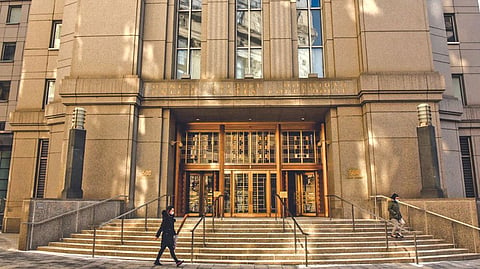

For more than five years, someone was stealing unpublished book manuscripts from editors, agents, authors and literary scouts. The question of who was behind the scheme baffled the publishing industry, but just as perplexing was another question: Why?
Most unpublished manuscripts would be almost impossible to monetize, so it wasn’t clear why somebody would bother to take them. Filippo Bernardini, who has pleaded guilty in a fraud case in which the government said he stole more than 1,000 manuscripts, offered an explanation on Friday in a letter addressed to a federal judge.
Bernardini said he stole the books because he wanted to read them.
Bernardini told Judge Colleen McMahon of the U.S. District Court for the Southern District of New York that his scheme began after a literary agency where he had interned declined to hire him for an open position. He was applying for jobs without success when he started impersonating publishing professionals over email.
“While employed, I saw manuscripts being shared between editors, agents and literary scouts, or even with individuals outside the industry,” he wrote. “So, I wondered: Why can I not also get to read these manuscripts?”
He impersonated specific individuals using fake domain names — for instance, penguinrandornhouse.com instead of penguinrandomhouse.com, with an “rn” in place of the “m.” The business of publishing is small and relationship-based, and few manuscripts are closely guarded, especially at certain stages of the process, like when agents submit a book to publishers. Bernardini found that if he asked in the right way, he could get the books he wanted. He said it became “an obsession, a compulsive behavior,” and that he wanted to feel as if he were still a part of the industry.
“At first it started as a challenge; I never believed that it would snowball into me performing these crimes as prolifically as I did, I got carried away,” he wrote. “I never wanted to and I never leaked these manuscripts,” he continued. “I wanted to keep them closely to my chest and be one of the fewest to cherish them before anyone else, before they ended up in bookshops. There were times where I read the manuscripts and I felt a special and unique connection with the author, almost like I was the editor of that book.”
Bernardini, 30, is an Italian citizen who has lived in London for many years. When he was arrested in New York City last year, at John F. Kennedy International Airport, he was working as a rights coordinator for Simon & Schuster U.K.
His letter was part of a package submitted to the judge in advance of his sentencing, which is scheduled for next month. The dossier included letters from his lawyer, his partner and his parents, as well as from friends and former colleagues. In their correspondence, they argued that Bernardini should receive no prison time, saying that as a gay man from a different culture and country, he would be particularly vulnerable. They also said that his crimes had not resulted in any monetary gain for Bernardini nor in any diminished value for the authors whose work he took.
Visit news.dtnext.in to explore our interactive epaper!
Download the DT Next app for more exciting features!
Click here for iOS
Click here for Android